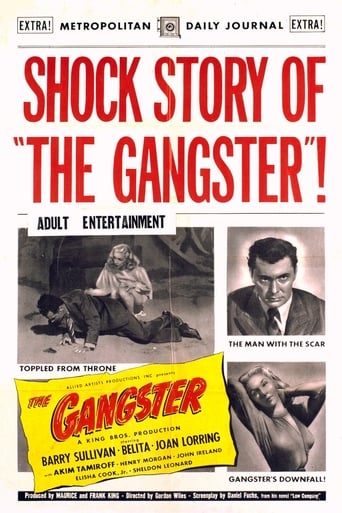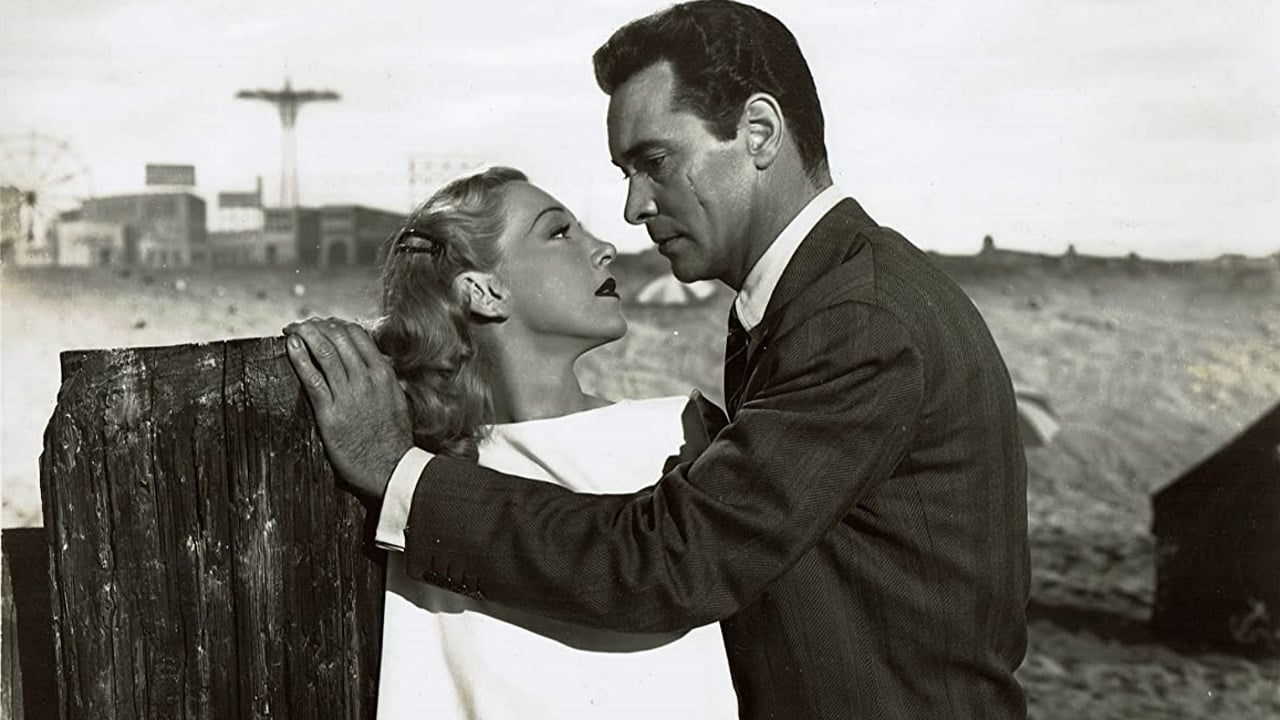mark.waltz
He got in early in his life, so now the only way out is a barrage of bullets in the back. He's Barry Sullivan, as tough a mob boss as you could ever find, and there's no Don Corleone politeness or Long Island mansion to hide in with the facade of legitimacy. There's nothing polite about the characters in this poetic but ultra gritty film noir that shows each of the main characters at their most vile, recreating New York City locations including an elevated train running, the Astor Place stop and an abandoned wharf where the violence gets pretty deadly. The fictional Neptune City is a unique replacement for similar beach communities like Coney Island and Atlantic City where corruption like this doesn't seem too far fetched. There really isn't a linear plot, but a series of events where the shadows of the city seems to emulate the darkness of the character's minds. This takes every film noir cliché and triples them, even more gritty than the classics made up until that time. This seems to be the kind of film that I could watch over and over and pick up new things each time. It's a living nightmare for Sullivan as he slips further and further into despair. While Joan Lorring and Belita are fine as the hard-boiled female characters, it's Harry Morgan, Sheldon Leonard and Akim Tamiroff in male supporting roles who get the raves. But the real stars are the script and the photography, perfect and moody in every way. In fact, just thinking about those technical aspects made me up my rating just by thinking about it.
classicsoncall
It doesn't happen very often, but it did here. The film's narrator and principal character, self-described crime kingpin Shubunka portrayed by Barry Sullivan, winds up dead at the end of the picture. How he gets to tell his story is a bit of a disconnect, but if that's something you can overlook, the ride is worth it.One never knows what you'll get with one of these Poverty Row efforts but this one looks like a keeper, due principally to it's great black and white photography, noir elements and a rather fine supporting cast. Shubunka himself is a conflicted fellow, one might even go so far as to say a bit unbalanced. The overbearing relationship he has with girlfriend Nancy Starr (Belita) contributes to his eventual undoing, though I'm inclined to believe it would have happened anyway, with or without her falling in with rival gangster Cornell (Sheldon Leonard).There's a puzzling side story involving Harry Morgan's soda jerk character Shorty wooing the older Mrs. Olga Ostroleng, her marital status perhaps kept purposely dubious. Shorty's proclamations of worldly conquests fall flat when he fails to win even the slightest peck on the cheek from the frumpy older woman. Unceremoniously dumped by Olga into the alley out her back door, Shorty's fate portends the downfall of the rest of the losers of Neptune Beach, including soda shop owner Jammey (Akim Tamiroff) and gambler Karty (John Ireland), as well as Shubunka himself. For old time cinema fans, stay alert and you'll catch Shelley Winters as the replacement cashier at the soda shop looking completely disinterested in what her boss Jammey has to say.
Martin Teller
A big fish in a small pond finds his little world crumbling around him when a bigger fish swims into town. Opening with a monologue so misanthropic it could have been penned by Travis Bickle, this is a brutal and cynical film. Allied Artists reunited the stars of Suspense, Barry Sullivan and Belita, and the results are an improvement. Sullivan is cold and paranoid as the titular character, completely without trust or sympathy in anyone around him. Belita doesn't get to do any ice-skating this time around, but she is very good as his long-suffering gal, her devotion and sincerity eventually beaten down by his suspicions. I said earlier that I was looking forward to more of Joan Lorring, and I was glad to see her here. She doesn't get a whole lot of screen time, but she has a wonderful part to play in the end. There's a couple of subplots to consider. John Ireland is a desperate gambler whose story hooks into Sullivan's at a crucial point. The part with Harry Morgan as a self-imagined Romeo is a bit more superfluous but provide some nice character moments. Also some fine supporting bits by noir regulars Elisha Cook, Charles McGraw and Sheldon Leonard (and a blink-and-you'll-miss-it appearance by Shelley Winters). The Louis Gruenberg score is occasionally overwhelming but mostly superb. And Paul Ivano's cinematography makes the most of the often cheap-looking sets, a lot of beautiful stylization, especially in the rain-soaked opening and closing sequences. Perhaps a little too self-conscious and stagy at times, but a very well-done, gloomy and sometimes poetic film.
dougdoepke
Smalltime gangster feels heat of competition, while romancing showgirl.The most interesting thing about this crime drama are the visuals. Director Wiles goes all out with the stylized sets—the beachfront, the elevated train, the complex interiors, et al. I guess that's not surprising given his background as an art director. Apparently the King Brothers let him do pretty much what he wanted even on the small budget. The result is arty, but interesting. Then too, maybe you can take those stylized sets as mirroring Shubunka's inner state since he seems not too far from the nuthouse to begin with.Sullivan certainly looks the gangster part. With his high cheekbones and gimlet eyes, he's scary even without the big scar. Plus, he's about as cold and animated as a block of ice. Sullivan's a fine actor so that is no accident, but the characterization seems too extreme to involve us in his fate. On the other hand, Loring's semi-pretty working girl comes across well, as does Belita's glamour girl with her odd facial resemblance to noir icon Gloria Grahame. Like another reviewer, I'm a bit stumped by the seemingly unnecessary subplot with Morgan and D'Orsay. At first I thought the producers probably owed D'Orsay something so she got a tacked-on part. But then I noticed a parallel between Morgan's narcissistic Lothario and Sullivan's narcissistic gangster. Each appears imprisoned by his own limitations. Notice too that Morgan appears trapped by a jail-like fence following D'Orsay' rejection, a possible foreshadowing of Sullivan's downfall. Anyway, it's a thought. But what I really like about the script is how Sullivan's indifference toward Ireland's desperate gambler brings about his own end— a nicely ironic touch. Also, note how the entrepreneurial criminal operations are tied in with corruption at higher levels of politics and big money. That seems unsurprising since both screenwriter Fuchs and the uncredited Trumbo were later blacklisted. In fact, noir appears the favorite genre of many leftist screenwriters, perhaps because of the potential for unhappy endings in a capitalist society.Nonetheless, the movie as a whole comes across more as an object of contemplation than of audience immersion, but certainly continues to have its points of interest.


 AD
AD


